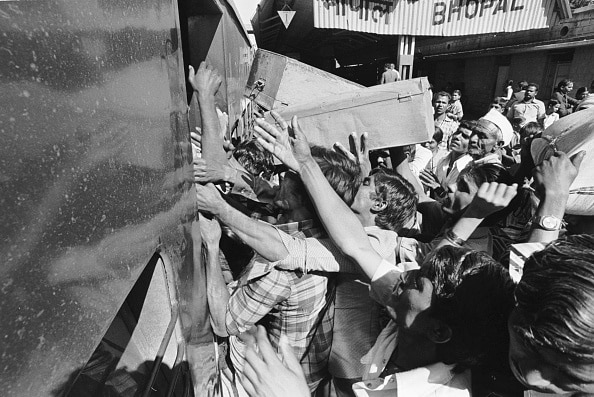40 Years of Bhopal Gas Tragedy & India’s Preparedness (GS Paper 3, Disaster Management)

Context
- Forty years after the Bhopal Gas Tragedy, the toxic waste left behind by the Union Carbide India Limited (UCIL) factory continues to pose significant threats to public health and environmental safety.
- The leak of methyl isocyanate (MIC) gas in 1984 contaminated the soil and water in Bhopal, leading to lasting environmental damage and serious health repercussions for the local population.
Issues Still Prevalent
- Despite the devastating effects of the tragedy, India’s chemical industry has expanded rapidly and is now the sixth largest in the world.
- The country witnessed 29 major chemical accidents between 2020-2023, even during the COVID-19 pandemic.
- Notable incidents like the Ammonia Gas Leak at Chennai (2024) and the Vizag Gas Leak (2020) resulted in significant casualties, highlighting that chemical accidents are still a serious concern.
The Ongoing Challenge
- The gas responsible for the Bhopal disaster, methyl isocyanate (MIC), is still in use in India.
- MIC is a highly toxic and reactive chemical, and exposure to even small amounts can cause severe respiratory distress, eye and skin damage, and long-term health issues.
- Furthermore, dangerous agricultural chemicals, such as the pesticide DDT (dichlorodiphenyltrichloroethane), remain unregulated, continuing to pose environmental and health hazards.
- India’s current regulations are fragmented and lack the comprehensiveness of laws like the US Toxic Substances Control Act (TSCA) or the EU’s REACH regulation, which regulate the use of hazardous chemicals and ensure the safety of citizens.
Reasons for These Disasters
Several factors contribute to the ongoing risks:
- Prioritizing Economic Growth: Rapid industrial expansion has often overshadowed safety concerns, with economic objectives taking precedence.
- Weak Regulatory Oversight: India faces challenges in enforcing safety standards due to limited resources, expertise, and political will.
- Industry Lobbying: Powerful industry lobbies influence policy decisions, often hindering the introduction of stricter safety regulations.
- Lack of Public Awareness: Limited public awareness about the dangers of hazardous chemicals reduces pressure on both industries and the government to prioritize safety measures.
Initiatives to Prevent Future Disasters
In response to these challenges, several initiatives have been launched to improve safety and prevent future disasters:
- Strengthening Regulations: Legislation such as the Explosives Act, 1884, the Chemical Accidents (Emergency Planning, Preparedness, and Response) Rules 1996, and the Environment Protection Act, 1986 aim to regulate hazardous industries and prevent accidents.
- National Green Tribunal (NGT): The NGT plays a crucial role in addressing environmental violations and providing a platform for affected communities to seek redress.
- National Disaster Management Authority (NDMA) Guidelines: These guidelines emphasize the importance of inspection systems, emergency preparedness, and community awareness in reducing the impact of chemical accidents.
Way Ahead
India needs to take additional steps to enhance safety and minimize risks from chemical industries:
- Comprehensive Chemical Policy: India urgently requires a comprehensive chemical policy with strong, enforceable regulations to prevent future disasters and protect public health.
- Corporate Responsibility: Ensuring that companies adopt strict safety measures and are held accountable for any accidents or negligence is crucial.
- Justice and Rehabilitation: Long-term healthcare and compensation for victims and affected communities must be prioritized to provide relief and justice to those impacted by disasters like the Bhopal Gas Tragedy.
- Environmental Safeguards: Implementing better disposal practices for toxic waste will help prevent further environmental damage and safeguard the health of surrounding ecosystems.
Conclusion
- As India’s chemical industry continues to grow, the lessons from the Bhopal Gas Tragedy remain relevant.
- A more comprehensive approach, with stronger regulations, greater corporate responsibility, and improved public awareness, is essential to prevent future chemical disasters and protect both public health and the environment.


